 Rhoda Feng
Rhoda Feng
The brunch must go on: the final musical by Stephen Sondheim sends up a group of trapped plutocrats à la Buñuel.
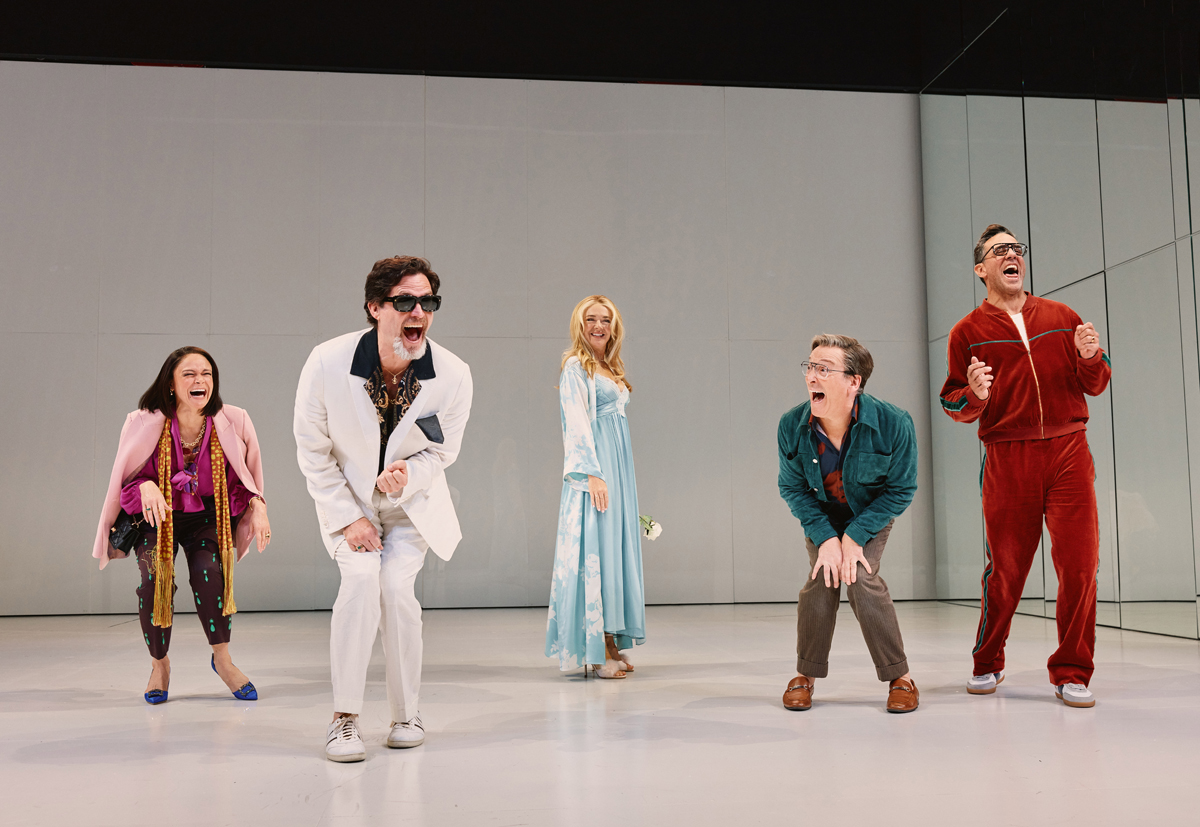
Cast of Here We Are. Photo: Emilio Madrid.
Here We Are, by Stephen Sondheim and David Ives, directed by Joe Mantello, the Shed’s Griffin Theater, 545 West Thirtieth Street, New York City, through January 21, 2024
• • •
“How did we get here, anyway? Can somebody tell me where we went wrong?” asks a character at the end of Here We Are, the much jawed-about new musical created by the late Stephen Sondheim and playwright David Ives. “Here” is a loaded word—one whose meaning takes two hours to fully disburse—but the trouble begins with a plutocrat’s self-parroting act, which sets the characters on their wayward path.
Upon showing up at her friends’ apartment for brunch one day, Claudia (Amber Gray), a talent agent who represents “a major entertainment entity,” complains to the Brinks about their “schmuck doorman,” who had the temerity to ask if she and her companions were “expected.” By way of indignant explanation, she told the doorman, “We’re their closest friends, and this is Raffael di San Blah-Blah, the ambassador of Moranda.” Explanations follow upon explanations, creating a clown car of elaborations.
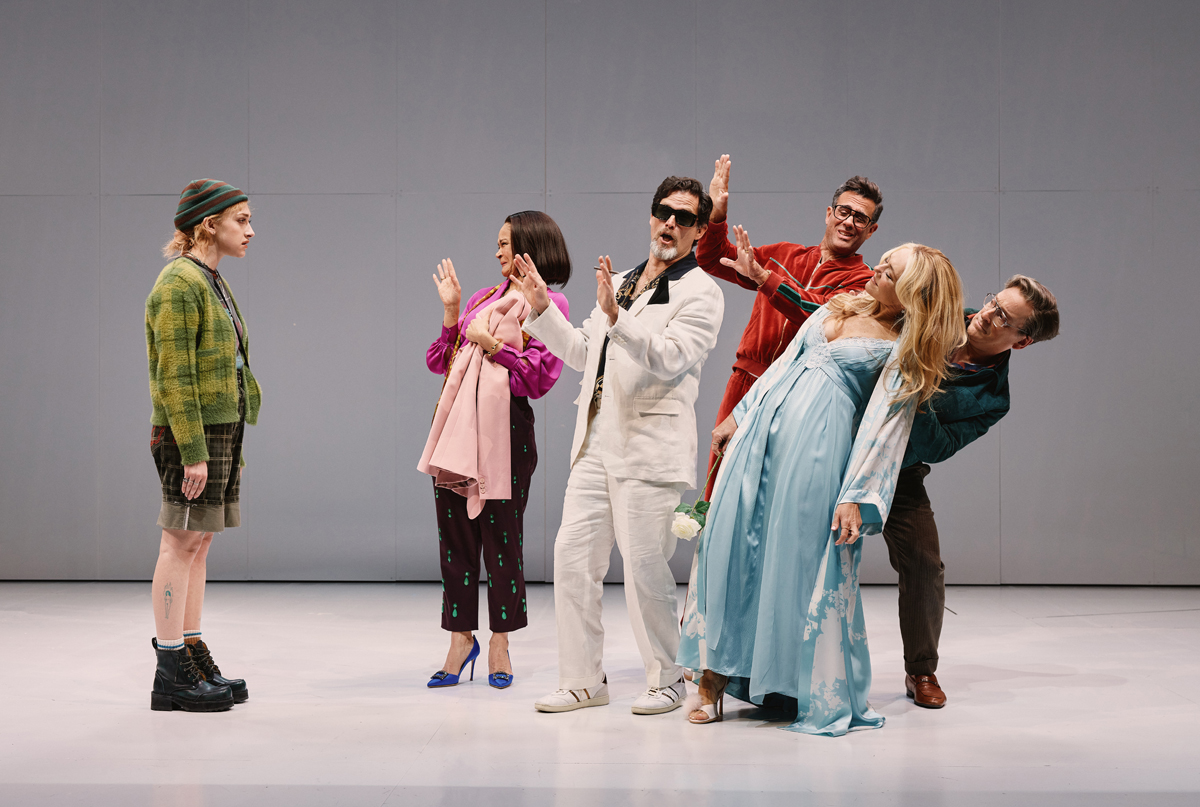
Micaela Diamond as Fritz, Amber Gray as Claudia Bursik-Zimmer, Steven Pasquale as Raffael Santello Di Santicci, Bobby Cannavale as Leo Brink, Rachel Bay Jones as Marianne Brink, and Jeremy Shamos as Paul Zimmer in Here We Are. Photo: Emilio Madrid.
It appears there’s been a mix-up: the hosts, Leo Brink (Bobby Cannavale) and his wife, Marianne (a radiant Rachel Bay Jones), attired in velour sweatpants and a blue peignoir, respectively, are not expecting guests on this day. Yet here they are, nevertheless—Claudia, her plastic-surgeon husband, Paul (Jeremy Shamos), and the womanizing Raffael (Steven Pasquale), all members of the jet set. Rounding out the cast is Marianne’s sulky younger sister, Fritz (Micaela Diamond), a soi-disant radical in combat boots clearly in the wrong pew. And so: food must be procured, brunch must be observed.
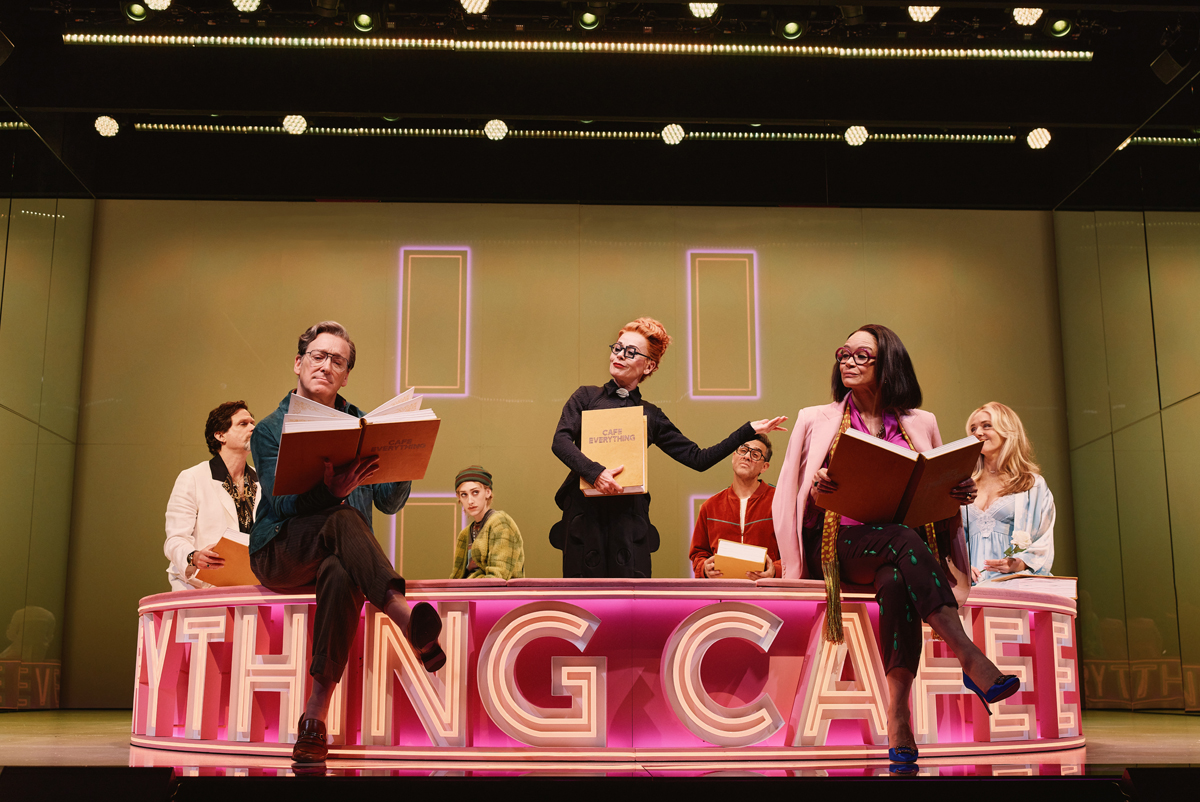
Cast of Here We Are. Photo: Emilio Madrid.
Sondheim and Ives’ musical is a clever and beguiling mash-up of two of Luis Buñuel’s Surrealist films: the Oscar-winning Discreet Charm of the Bourgeoisie, about a group of French aristocrats trying and mostly failing to come together for a meal, and The Exterminating Angel, about a group of Spanish swells scrambling to flee one another while trapped in a claustral room. In the play’s first act, titled “The Road,” the group of six goes in search of viands—to no avail. Café Everything, notwithstanding its doorstop menus, is completely out of food; Bistro a la Mode, famed for its French Deconstructivist cuisine, is hosting a funeral for the former proprietor of the restaurant, which spoils the mood for the gang and speeds them posthaste to their next location: Osteria Zeno, purveyor of ersatz food. At the last establishment, the group crosses paths with a colonel (Francois Battiste) tracking the movements of an international drug cartel and a dreamy, lovelorn lieutenant (Jin Ha), who instantly falls for Fritz. Sondheim’s lavish gifts for lyric—for forging glass-blown song from the soul’s smithy—make themselves keenly felt in the soldier’s warblings. “It’s the end of the world / There is nothing but you,” he sings. Fritz, previously lesbian (just go with it), is equally entranced; their duet has all the tenderness of two young shoots veining toward the sun.
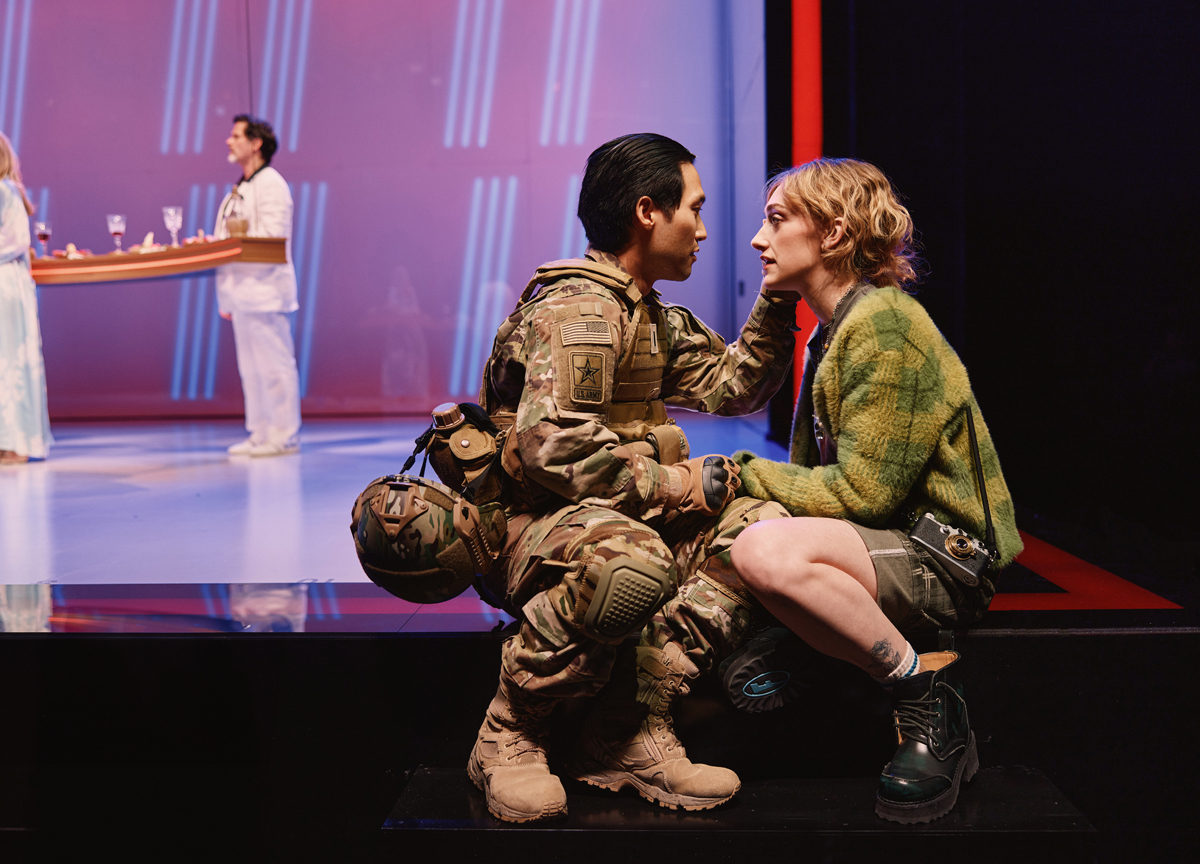
Jin Ha as Soldier and Micaela Diamond as Fritz in Here We Are. Photo: Emilio Madrid.
From Zeno, the cast, which has now swelled beyond the original six, wends its way to Raffael’s Morandan embassy. The latter furnishes “The Room” of the musical’s second act. As in Exterminating Angel, the obscenely wealthy personages spend some time lolling about in dolce far niente before realizing that none of them can leave the space of their own volition. A mysterious force compels them to stay within the perimeter of Raffael’s book-lined library; each time one of the gang approaches the lip of the stage, they pause, as if bumping into a cognitive banister, or about to achoo an esprit de l’escalier. Trouble mounts from there: the baby grand suddenly goes mute (a bishop who has insinuated himself into the group offers a blessing), they discover the servants have absconded in the dead of night, and Windsor, Raffael’s English butler (Denis O’Hare, who also plays the waiters at the cafes in act 1), turns out to be neither English nor a butler but the impassioned leader of PRADA, or the People’s Revolutionary Anti-Domination Army, who goes by the code name Inferno.
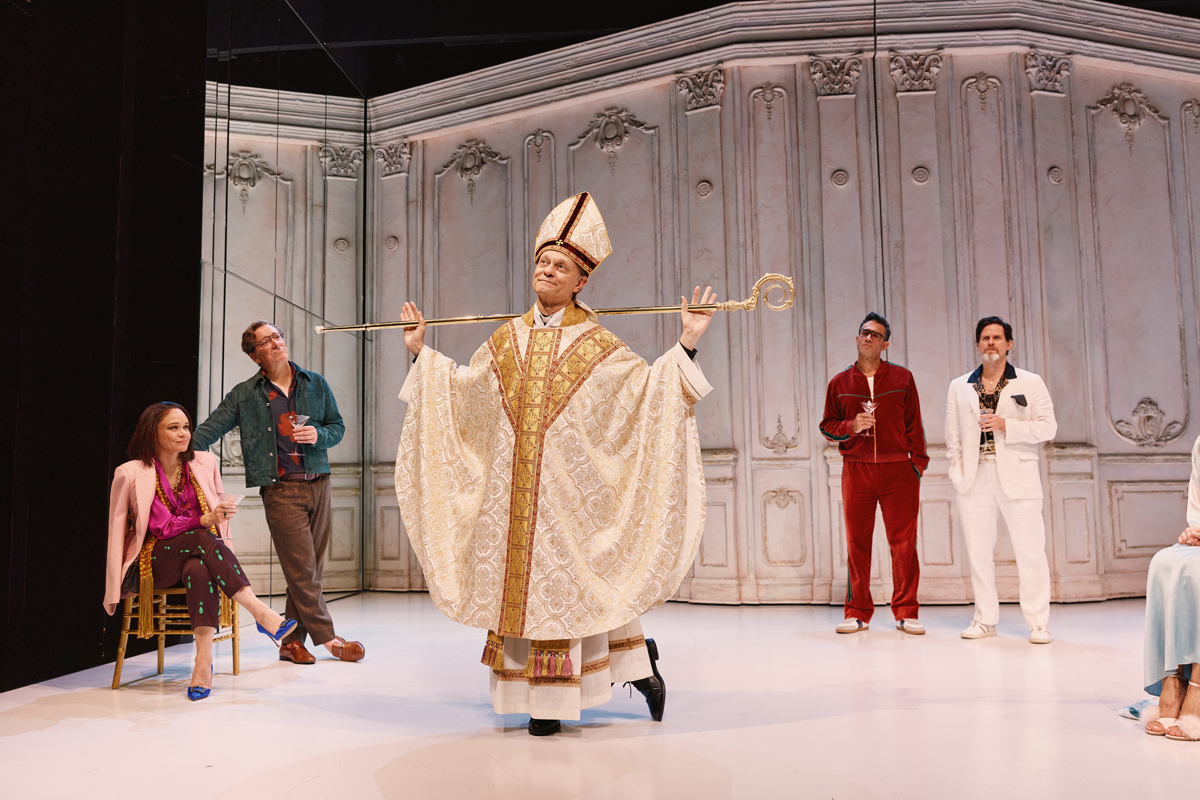
David Hyde Pierce as Bishop and the cast of Here We Are. Photo: Emilio Madrid.
The formerly marmoreal manservant has been conspiring with Fritz (code name Apocalypse) all along to topple the ruling class—or maybe just the pumpkin (read: drug) cartel run by Paul, Leo, and Raffael. While the guests are sleeping, Inferno has the presence of mind to steal the only weapon in the room, belonging to the colonel, and soon has the group in his thrall. He charges his wealthy hostages $200 for a Danish from the food cart, commands the clique to bleat like sheep, and purports to teach them about laissez-faire economics (“I’m the laissez. You’re the faire.”) It’s all very Lord of the Flies sautéed with No Exit. Once the supply of pastries has been exhausted, the hungry captives are quickly reduced to drinking water from a flower vase, munching on roses and paper, and relieving themselves in a Ming jar.
The second act is also where the music effectively grinds to a halt. It’s as if the characters, having become sensate to their sessile state, no longer have the wherewithal to hum—or belch, in Leo’s case—even a few bars about their predicament. Instead, they devolve into petty squabbles that quickly turn into character assassinations. Claudia accuses Raffael of trapping them in his embassy: “We’re rats on a sinking ship. On your ship, Raffi.” The remark is a slight twist on Discreet Charm, in which a despairing member of the aristocracy refers to the servants who have abandoned them as rats who have deserted the ship; here, the rich ravenously turn on each other.
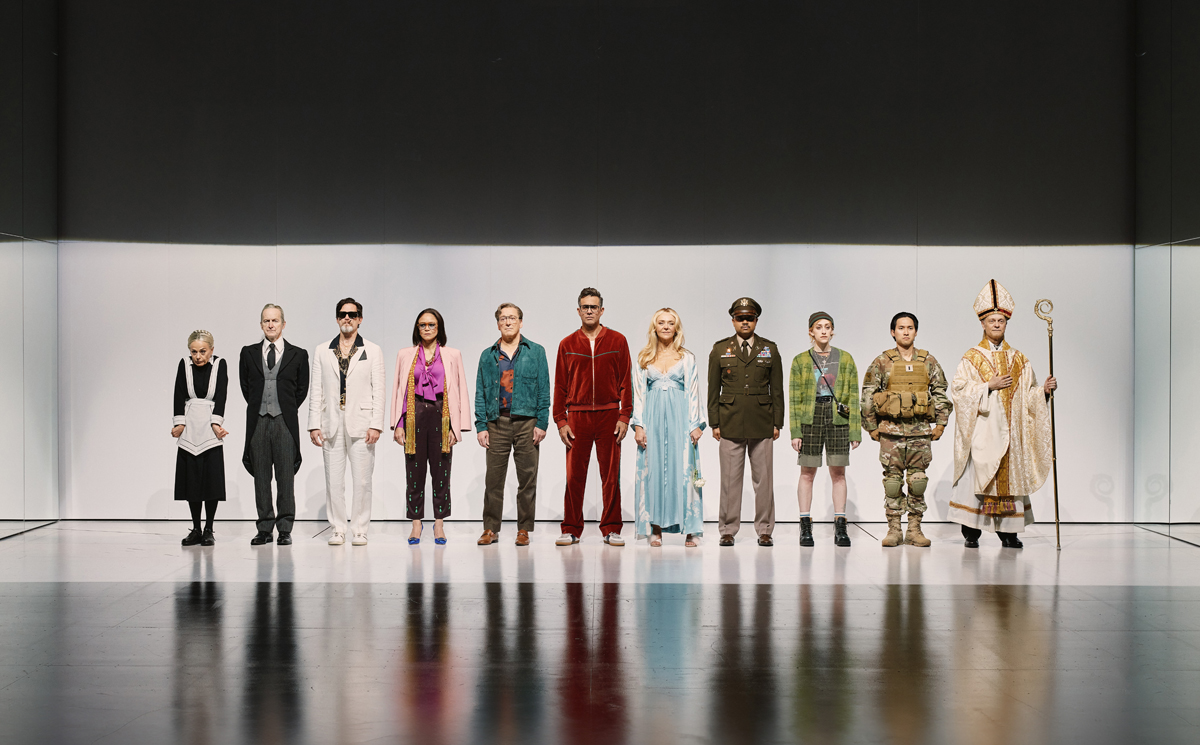
Cast of Here We Are. Photo: Emilio Madrid.
Which is not to say that the issue of class evaporates; in fact, it rears its head before the musical even begins. Bracketing the fact that Here We Are is staged at the Shed—that hideously sleek avatar of capitalism—and that tickets go for more than $100, the first person we see onstage is a woman in a maid’s uniform wordlessly polishing a mirrored panel to a fare-thee-well (David Zinn designed the immaculate set). Those sitting a few feet away from the stage can easily see themselves reflected in its sheen: the suggestion is not exactly subtle. It’s impossible to watch the musi-play and not think about other eat-the-rich satires or tales of plutocrats sleepwalking into the climate apocalypse. Or not murmur, with Fredric Jameson, that it is easier to imagine the end of the world than it is to imagine the end of capitalism.
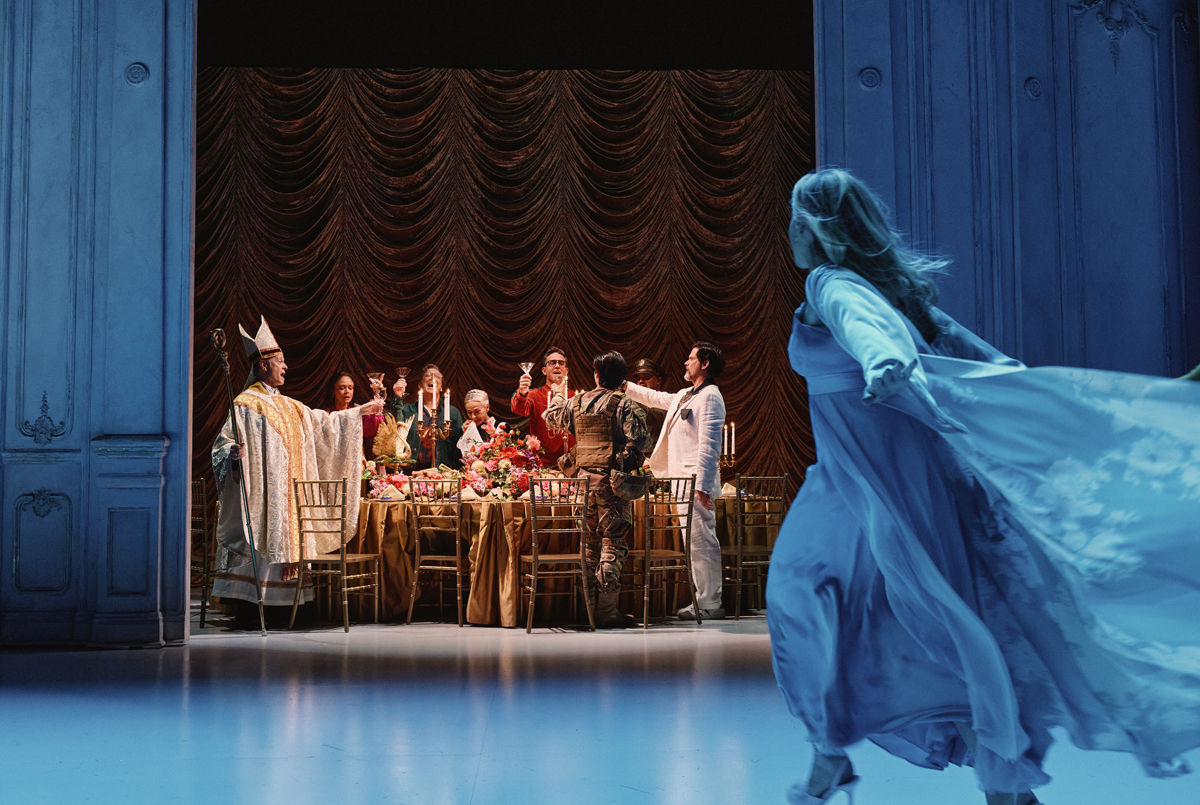
Cast of Here We Are. Photo: Emilio Madrid.
And, indeed, in Here We Are the end of capitalism is forestalled, and the superrich get to live another day. As in The Exterminating Angel, the curse is lifted when the characters find themselves occupying the same positions in the room and repeating their lines of dialogue from the earlier evening. The innovation of Sondheim and Ives’ musical is to oppose this final moment of verbatim repetition with the instance that opens the play. If the first reiteration was performed in a blithely scornful mode, the second recital is imbued with all the deliberation of actors learning their lines, marbling over their meaning. The latter act of recall both solders the characters to their earlier selves and requires that they stand at a bit of a tangent to themselves: they are and are not identical to the people they were days ago. The play finally ferries them to a “here” that is neither origin nor destination, but somehow both.
Rhoda Feng is a freelance writer based in Washington, DC.